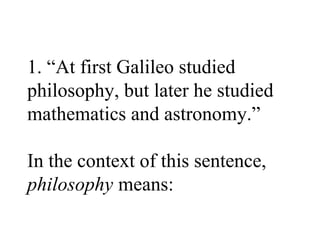Recommended
Recommended
More Related Content
Similar to Galileo vocabulary
Similar to Galileo vocabulary (20)
1: Aristotle, The Categories and Ordering the World

1: Aristotle, The Categories and Ordering the World
Introduction to the Philosophy of the Human Person_Module 1.pdf

Introduction to the Philosophy of the Human Person_Module 1.pdf
1 Running head THE ETHICS OF ELEPHANTS IN CIRCUSES .docx

1 Running head THE ETHICS OF ELEPHANTS IN CIRCUSES .docx
Behaviorism explained with examples for B.Ed M.Ed & PhD

Behaviorism explained with examples for B.Ed M.Ed & PhD
More from Anne Agard
More from Anne Agard (20)
Galileo vocabulary
- 1. 1. “At first Galileo studied philosophy, but later he studied mathematics and astronomy.” In the context of this sentence, philosophy means:
- 2. phi‧los‧o‧phy plural philosophies 1 [uncountable] the study of the nature and meaning of existence, truth, good and evil, etc: Emma studies philosophy at university.philosophy of the philosophy of science
- 3. 2 [countable] the views of a particular philosopher or group of philosophers philosophy of the philosophy of Aristotle
- 4. 3 [countable] the attitude or set of ideas that guides the behaviour of a person or organization: The company explained their management philosophy. The idea that you should treat others as you would like them to treat you is a fine philosophy of life.
- 5. “At first Galileo studied philosophy, but later he studied mathematics and astronomy.” In the context of this sentence, philosophy means: Meaning #1
- 6. 1 [uncountable] the study of the nature and meaning of existence, truth, good and evil, etc: Emma studies philosophy at university.philosophy of the philosophy of science
- 7. 2. “Before Galileo, scientists did not do experiments. They just guessed about how something happened. Galileo was different. He did not just make guesses. He did experiments and watched to see what happened.” In the context of this sentence, is experiment a noun or a verb?
- 8. ex‧per‧i‧ment n. [countable] a scientific test done to find out how something reacts under certain conditions, or to find out if a particular idea is true
- 9. ex‧per‧i‧ment v. to do a scientific test to find out if a particular idea is true or to obtain more information experiment with/on
- 10. “Before Galileo, scientists did not do experiments. They gust guessed about how something happened. Galileo was different. He did not just make guesses. He did experiments and watched to see what happened.” In the context of this sentence, experiment is a noun.

